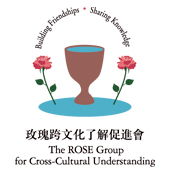Mandarin Meanings-Andrew Wyndham, VFH
 Six weeks before our U.S. departure, my "trip" to China begins at Charlottesville's Barnes and Noble, with the purchase of three "learn Mandarin in your car" CDs. A companion audio narrative is cheerfully optimistic, but my first experience of learning is, to say the least, unnerving. Six weeks before our U.S. departure, my "trip" to China begins at Charlottesville's Barnes and Noble, with the purchase of three "learn Mandarin in your car" CDs. A companion audio narrative is cheerfully optimistic, but my first experience of learning is, to say the least, unnerving.
The sounds of Chinese seem impossibly difficult; they jangle in my ear. Practicing those words, unconnected to any I know, with shapes and tones that actually strain the muscles of my mouth and throat, leaving them vaguely sore, initially stupefies me. Sentences are thought stopping in their run-on oddity--the perplexing experience is of a taunting assault on the mind and ear. Beginning over, repeating words forgotten for the fifth time, I am intensely frustrated.
Yet, something urges, "Go on, go on. Many a Western tourist has successfully done this before you; the situation cannot be irredeemable." And then there is the looming fact that Susan and I will need at least a few essential sentences (Qingwen xi shou jian zai nali?*) when we meet to head south from Shanghai, following the delegation's tour. More than this, early one morning as I practice, mere discord momentarily turns tuneful--not quite to a melody, but now, at least, I hear some notes and instinctively sense the play. Thus what was bordering on aversion, quite unaccountably begins to attract--even to fascinate.
Nine weeks later, we are sitting in the dining area of a homey lodge on the banks of the Yulong River, some miles south of the town of Yangshuo in Guangxi province. Outside, lining the bamboo-festooned waterway for miles in either direction, limestone karsts (mountains like those improbable shapes in the scroll painting we have long had on our bedroom wall at home) are magically beautiful. Xiao Jiao, our teenaged waitress, is singing out words for the delicate green tea that I have come to relish, correcting my pronunciation: "Llluuu chaa!" The evident pleasure she takes in the exaggerated repetition reminds me of the joy Italians show in the sound of their native tongue. She, along with others at this retreat, has assumed the task of instructing at least two journeying Americans on the rudiments of speech. Unexpectedly, she sits down at our table and proceeds with "the lesson." To order the dishes we want, we must first pronounce with precision the Chinese words for them. If momentarily taken aback, we are also charmed by and even grateful for this somewhat rigorous kindness.
Months later, back in Virginia, I can still hear the echoing voices of the many Chinese individuals who took time, on the spur of the moment and without expecting reward, to teach us, or recommend new sites to see, or take us to an ancient family home, or help us get back to our hotel at night. Even now, we are processing the experience, which was overwhelmingly one of learning a new language--of finding one's way and being lost at the same time; of discovering the means to connect with other humans in the welcome tones of a genuine exchange; of being uncertain of the meaning of much of what we were hearing and seeing; of experiencing the full range of emotions, from elation and awe to a sobering or disturbing sense of distress.
Today, China is real for me in a way that it never was before. And learning the language has become like a little retreat, for now I love the sound of the words. Yet, like the characters of its script, the country still seems vastly complex and inaccessible. Because or in spite of that, I continue to study Chinese, in pinyin, courtesy of an excellent web site out of Shanghai. And in my limited linguistic neighborhood, which seems more intriguing than ever, the words shape me in a way that feels beneficial, though I still don't quite know why.
China, too, has been like that for me--often opaque and perplexing, but a needed, opening encounter with a culture I previously ignored because of its inaccessibility, or strange and seemingly threatening character, but whose many positive dimensions I have begun to appreciate. The fundamental question of language, of course, is the question of meaning. And the meanings of China itself are many and conflicting, depending on one's focus and perspective. I am still struggling to accommodate what I have seen there--and what I have not seen with my own eyes but know. The language of the futuristic architecture of Shanghai can be elating. The sounds and rhythms of life in the old hutong neighborhoods of Beijing can be endearing--though that gritty, booming city as a whole, endlessly sprawling, seems less so. But the meaning in the faces of peasants in depressed circumstances, on side roads just hours beyond the capital or, a world to the south, in a remote fishing village on the Li River, troubles me still.
China can truly inspire with the rhythms, the energies of human hope and expression. This ancient culture, with an urban population that has been catapulted into the economic future, is sensing its internal arguments, again tentatively voicing a language of alternatives. The form this conversation ultimately assumes, or the change it may entail, is beyond anyone's guess or power. So I study some Mandarin meanings, hoping the better to understand what may happen next.
Andrew Wyndham-Wen De An |



